There’s a primal thrill to lifting something up and seeing what’s beneath it. It’s the entire philosophy behind Whack-a-Mole. And if you peel that idea back just one more layer, you’ll find Corps of Discovery waiting beneath, daring you to look.
At first glance, it’s a game about exploration, with Lewis and Clark, but with less manifest destiny and more manifest monsters. You and your friends have been tasked with mapping the wilds of a monster-riddled America, flipping over terrain in search of precious resources, deadly beasts, and occasionally, the exact thing you needed not to die that turn.
But beneath the theme, the ornate illustrations, and even the grid of chunky tokens hiding the board, is something more elemental: this is a game about curiosity weaponized against survival. Every decision is a gamble. Every reveal is a risk. Every move could draw you closer to the answers you need or the end you probably deserve.
Welcome to the Wilderness, Please Mind the Monsters
Mechanically, Corps of Discovery unfolds like a cruel twist on Minesweeper, where each wrong click costs you food, water, and your very last hope.
The board starts concealed, except for one lonely peak tile, and you’ll take turns revealing spaces orthogonally adjacent to the ones you’ve already uncovered. Under each tile: maybe a berry bush, maybe a helpful tipi where you can trade, maybe a skull hinting at yet another lurking monster ready to leech away your dwindling sanity and supplies.
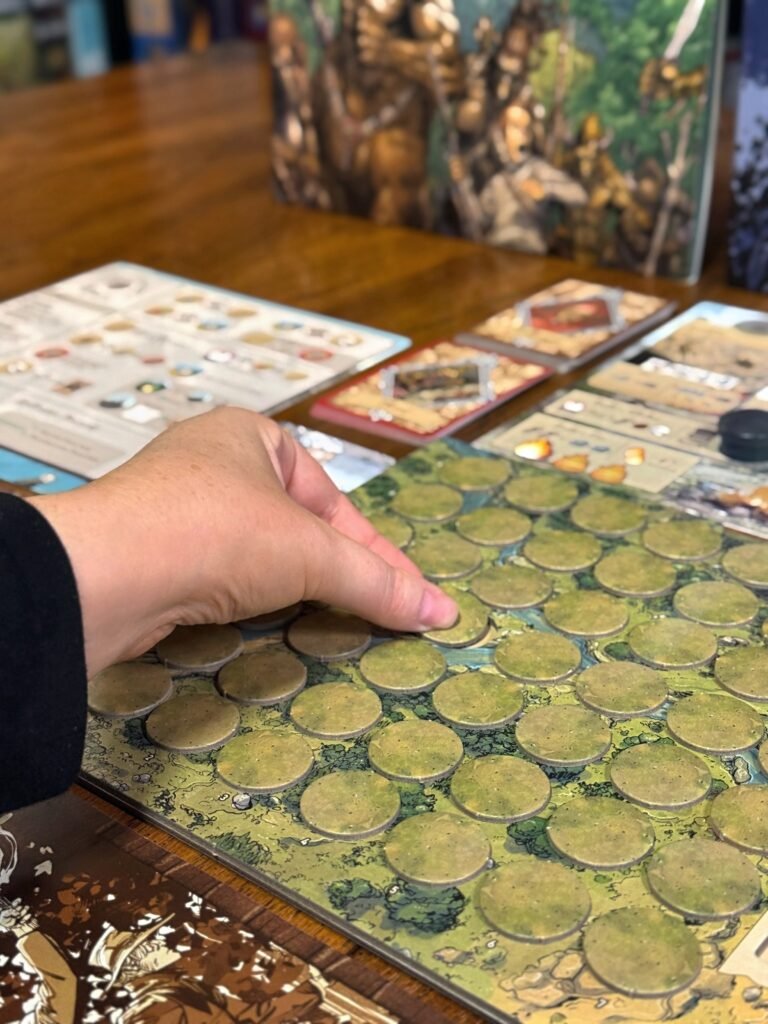
Your survival depends not only on the luck of your reveals but on your group’s ability to piece together the hidden logic of the land.
- Water is always beside wood
- Tipis are never too far from monsters
- All rocks connect to form an impassable ridge through the land
These aren’t narrative fancies; they’re hard rules, tucked away on your reference sheet, that follow you throughout each map you play, daring you to deduce your way through them.
Don’t Just Flip, Think First.
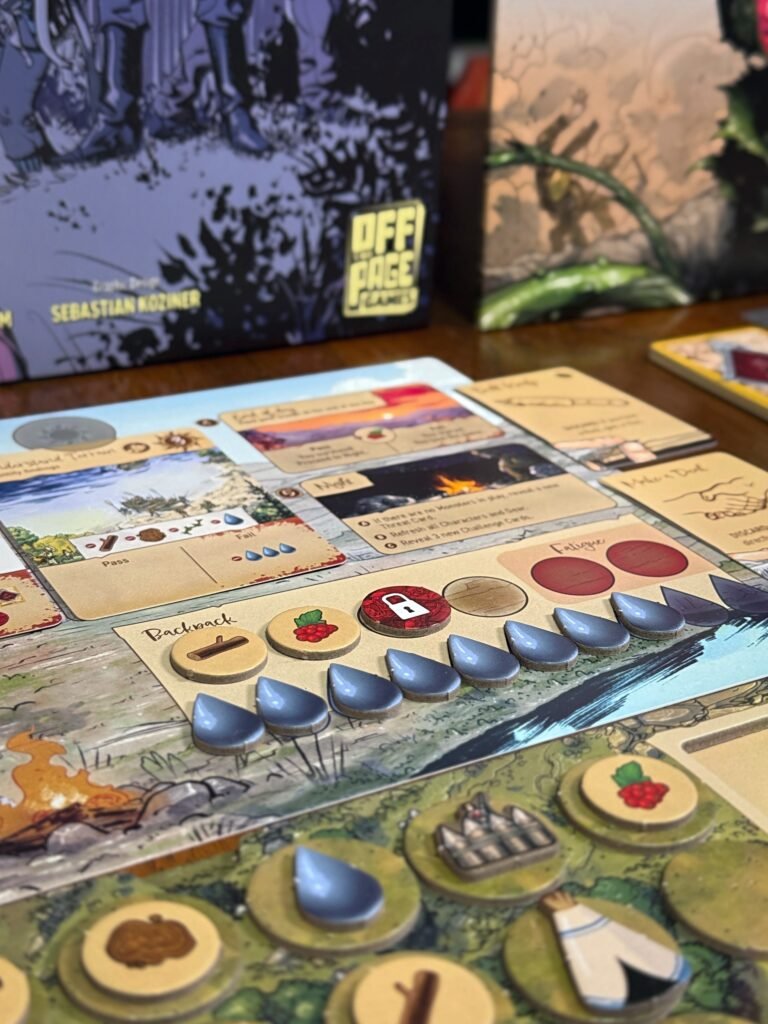
Deduction is the true meat on these bones. If you want to treat this as a game about wandering aimlessly and flipping tiles for dopamine hits, Corps of Discovery will punish you ruthlessly.
It’s not an easy game.
Mistakes bleed resources, and resources bleed victories. Misread the map, chase the wrong tile, and you’ll find yourself parched, starving, and knee-deep in regrets.
Survival is a chess match played blindfolded, your pieces hidden beneath the fog of wilderness and slowly revealed through cautious logic and collective reasoning (but yes, sometimes blind luck).
What’s For Dinner? Failure.
Deduction alone won’t save you. Not when every day is another three-part ordeal of challenges you may or may not be equipped to handle. Each day begins with new demands: spend these resources, gather these items, and survive this storm; failing to do so adds to the mounting pressure.
Sometimes the smartest play isn’t survival, it’s choosing your failures wisely. Maybe you let the storm batter you because hoarding water for the inevitable monster fight is the lesser evil. Maybe you decide that losing a bit of health to fatigue is preferable to spending your last food token early. It’s a brutal economy of sacrifices, made tenser by the fact that water, the game’s ultimate death clock, trickles away with each mistake.
But we like a game that teaches you that failure is part of the process. Breaking you down is part of what makes succeeding that much more tactically tasty!
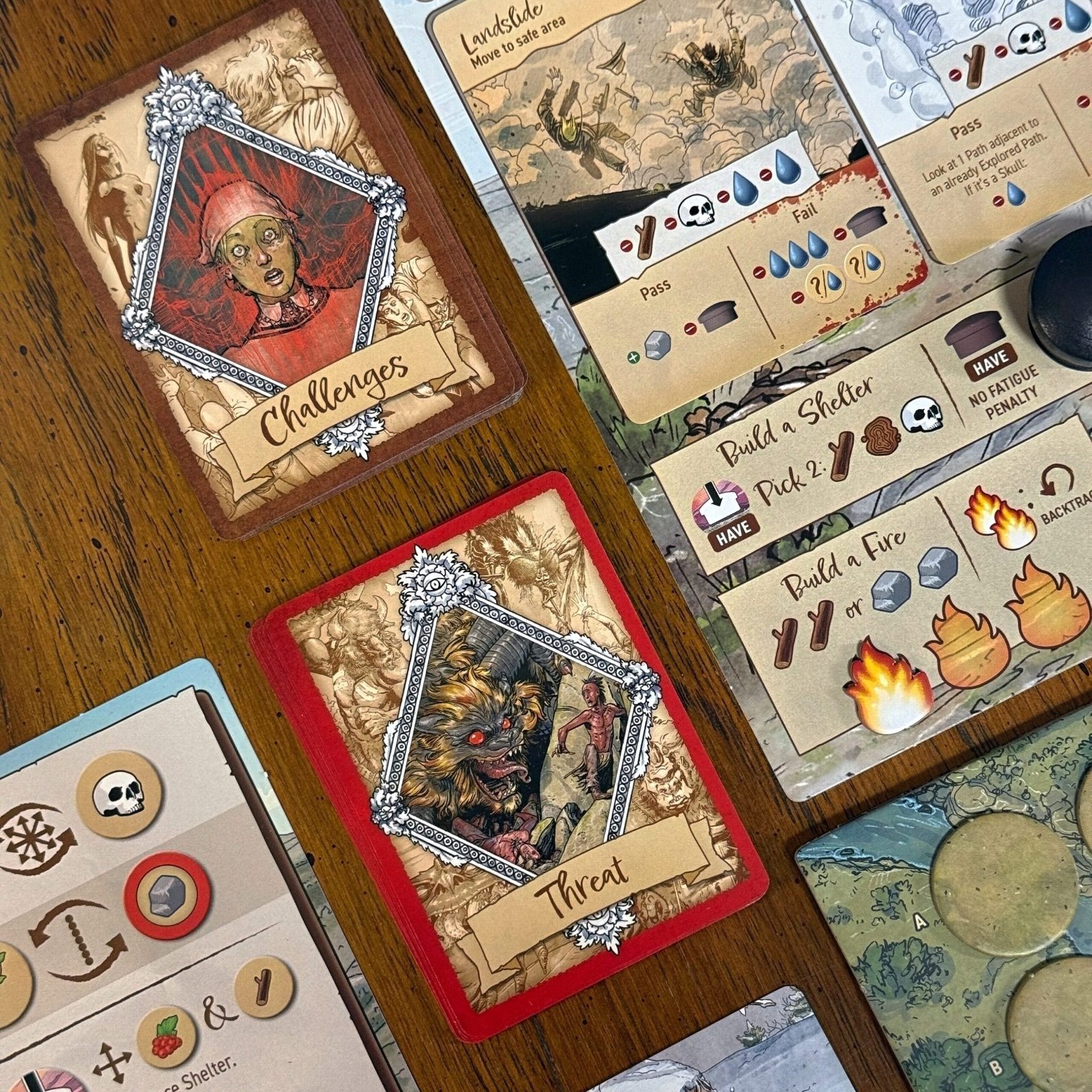
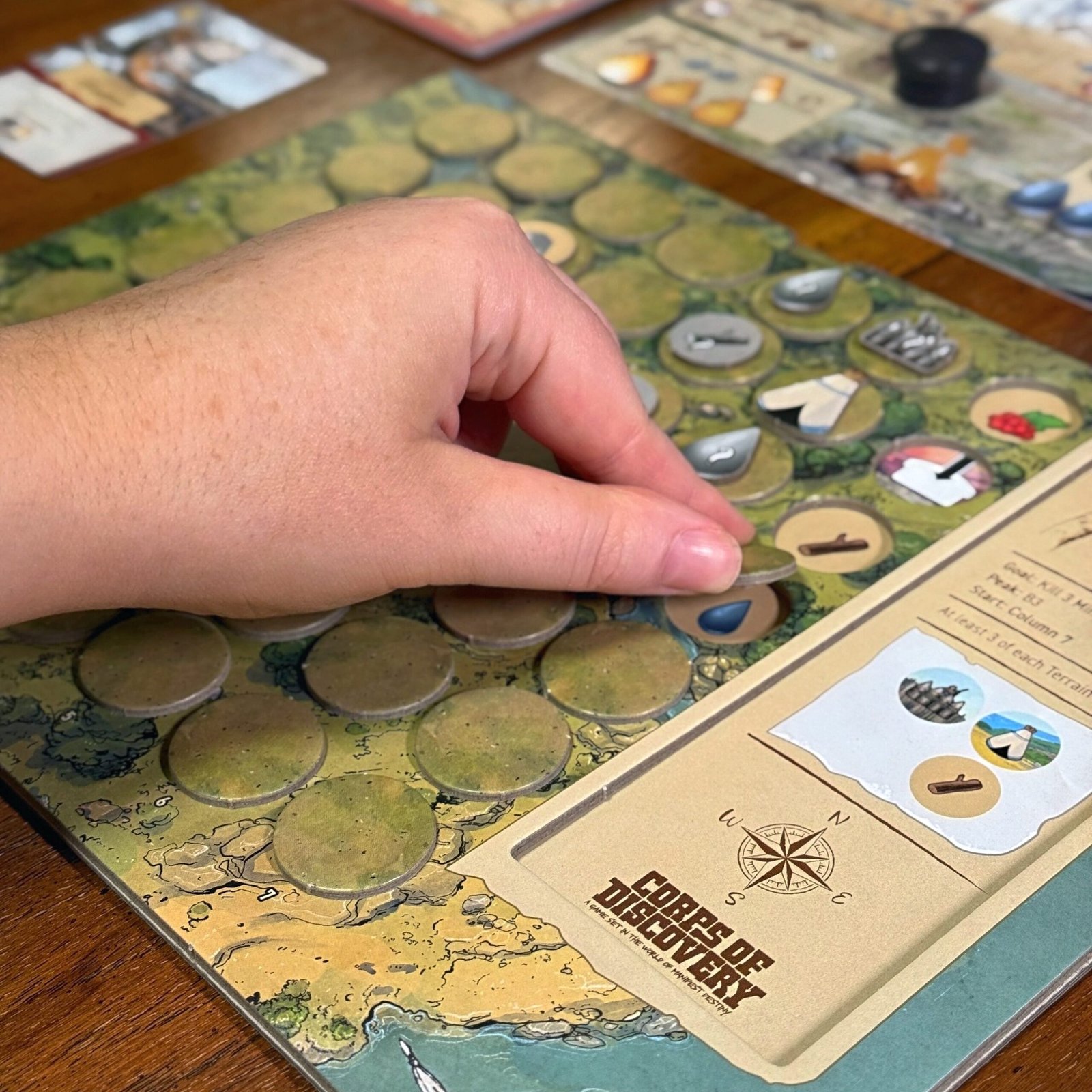
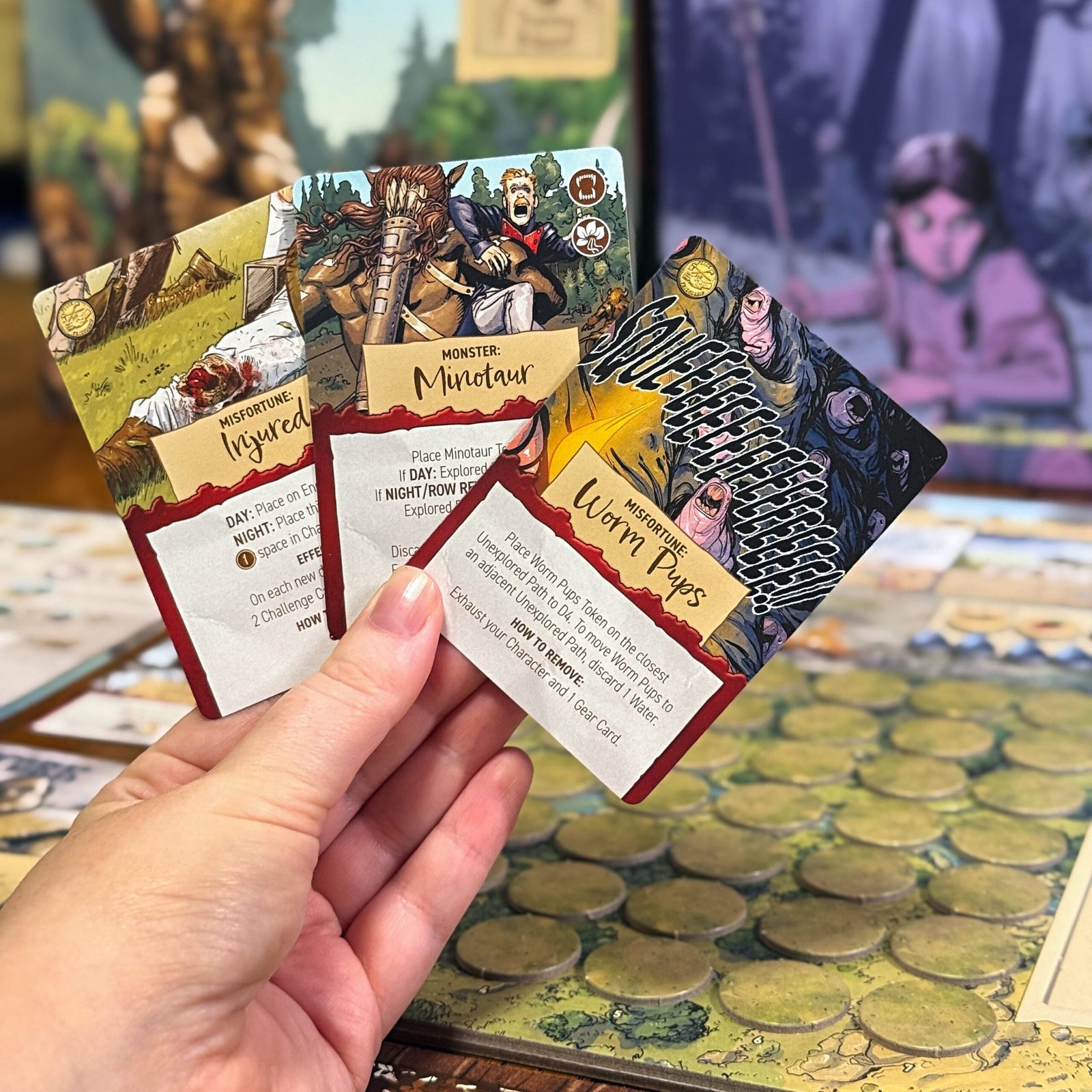
Survive Together or Die Thirsty
And that’s where teamwork comes crashing in.
At its best, Corps of Discovery delivers all the hallmarks of a great cooperative experience. Roles are asymmetrical: Lewis can double your resources, while York can bypass resource costs to explore paths crawling with monsters. Gear and Destiny cards give you just enough agency to feel clever, but not so much to feel secure.
Everyone is pulling on different levers, mitigating risks, managing threats, optimizing for survival. And crucially, everyone has a reason to speak up.
The deduction puzzle sprawls in so many directions that a single player can’t hold all the threads alone. Collaboration isn’t just encouraged; it’s necessary. The map won’t solve itself, and survival hinges on shared logic, pooled insights, and the occasional group-wide crisis of confidence.
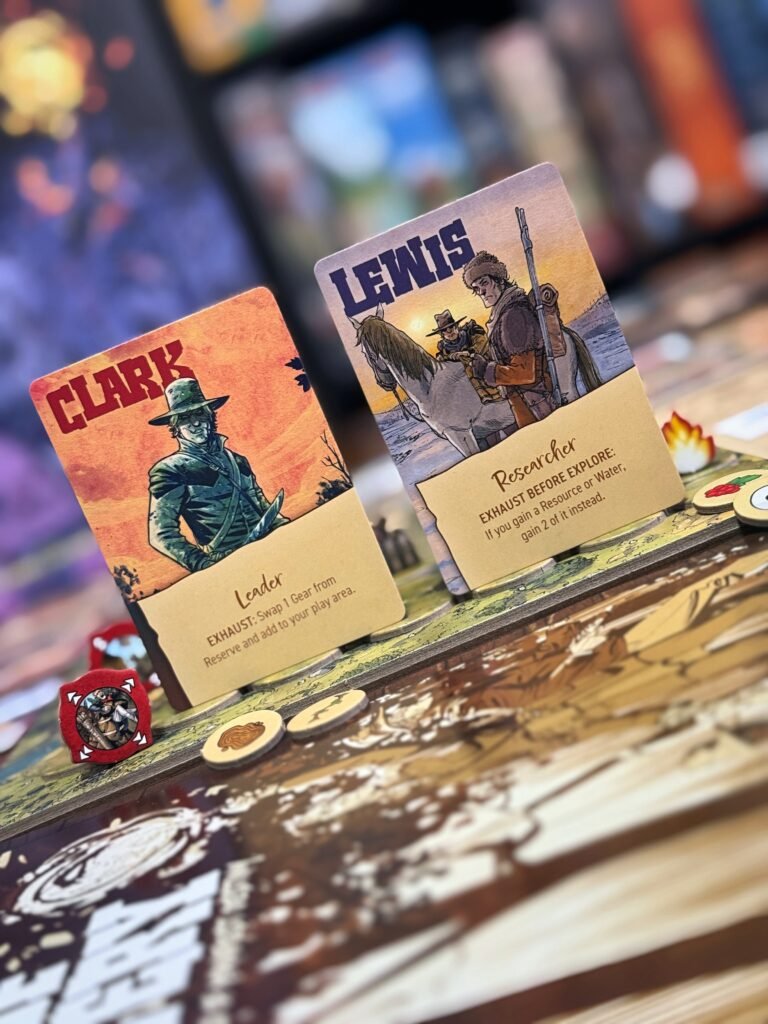
But quarterbacking is technically possible, though it rarely feels necessary. Unlike the branching crises of Pandemic, Corps of Discovery channels its tension inward into the map, into the deduction, into the creeping doom of dwindling water supplies. There’s little room for grand, competing strategies; there’s only the collective crawl toward understanding: you need more water, you get more water.
Of course, this can make for quieter tables, more reflective plays, but it also means less fiery debate and fewer stand-up moments of triumph. This is a game of slow, patient erosion, not fireworks.
The Game Is the Monster
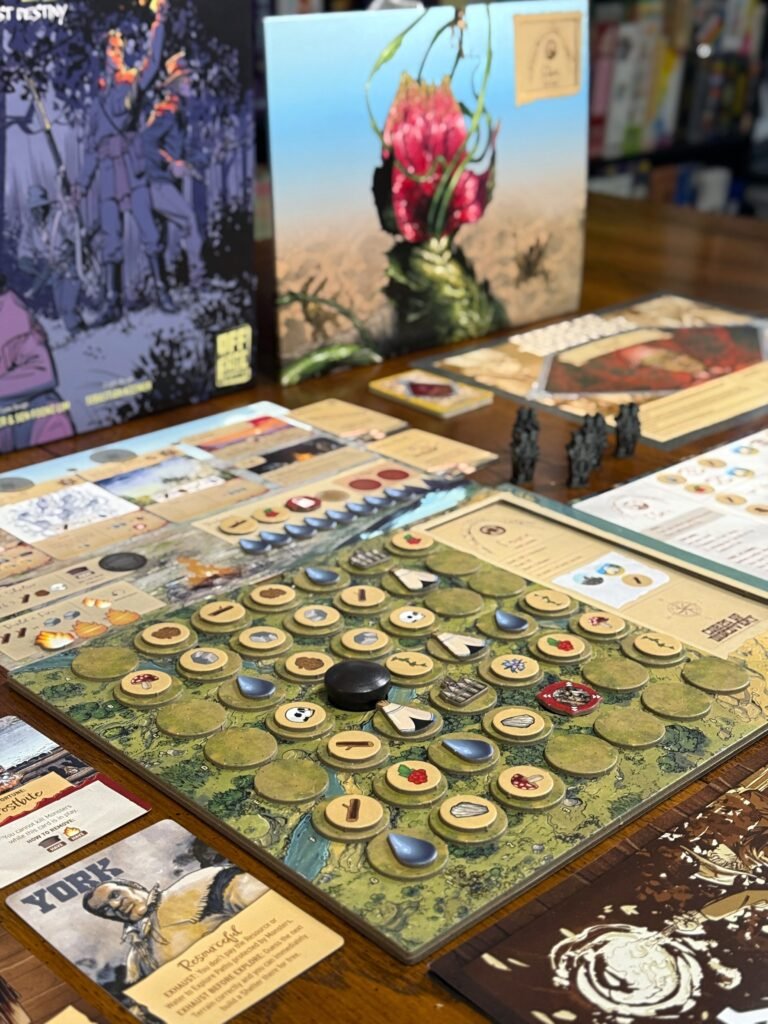
Where the game shines is in how it captures the slow drip of mastery.
We’ve only played twice so far, and our first go felt frantic and overwhelming. Our second play, with the rules internalized, the logic clearer, and the stakes better understood, felt sharper, more purposeful. You learn to plan around the cascading consequences of exploration.
You begin to weigh each challenge not only in terms of immediate survival but in the broader arc of the scenario’s win condition: slaying Minotaurs in Fauna, torching a monstrous plant in Flora. And as your information expands, so too does your confidence—until, inevitably, the map proves you wrong.
But Discovery Has an Expiration
Yet for all this, there’s a creeping shadow over the horizon. Although the maps are a decent size, and there are plenty to shuffle through in the base game alone, discovery—once achieved—may not remain novel. Once you’ve whacked these maps a few times, the freshness is likely to wane. Even setting the game up for photos, it was easy to remember where icons were in relation to one another.
Yes, the publisher promises more maps, expansions, and downloadable content to keep the wilderness sprawling (there’s a lot of content you can pick up), but the loop itself remains the same. Reveal, deduce, survive.
The scenarios offer variety in flavour, but the bones beneath remain familiar. Replayability relies less on evolving gameplay and more on the limitations of your memory. How many 7×7 grids can you truly forget before the game begins to feel procedural?
A Tightrope Walk Between Genius and Guesswork
There’s also the matter of difficulty, or perhaps, clarity. Success often feels balanced on a razor’s edge between planning and luck. Did you gather the right resources three turns ago for a threat you couldn’t yet see? Did you pick the right challenge to fail in the hope of lasting long enough to succeed elsewhere? Did you make one too many deductions on faith alone?
The game demands that you fail often, and while some players will relish the brutal stakes, others might find the experience less a puzzle to solve than a gauntlet to endure.
We found several times, the deductions could end up being wild guesses. The game could set you up to fail. You don’t know how many vines are on each map, how many ‘nothing’ spaces are included. How much mud do you have left to uncover for the remaining challenges that require 3 of these?
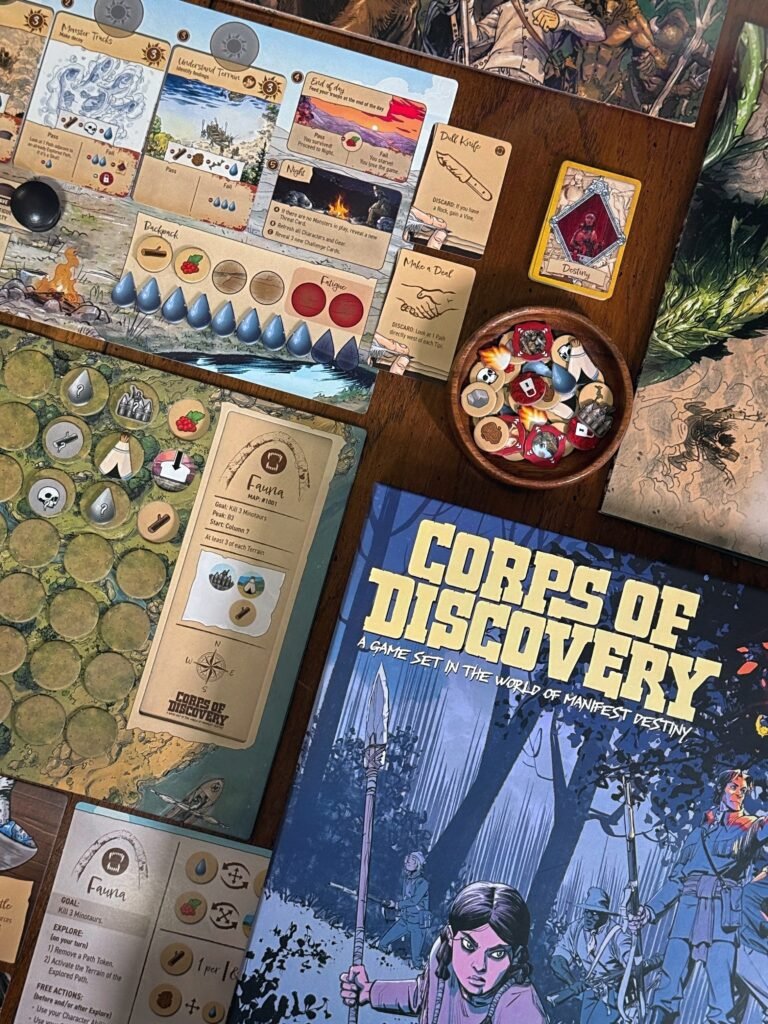
Sure, the game lets you trade and gives you access to some useful destiny cards and gears. But it’s likely there will be times where you’re just stuck, set up for failure without realizing it just yet.
Final Thoughts
So where does that leave Corps of Discovery? It’s certainly not a game for everyone. We loved the shared puzzles, deduction, and the grim satisfaction of surviving against mounting odds. It offered a rewarding, if punishing, experience.
For those seeking big, cinematic moments of victory or sprawling narrative arcs, this might feel too mechanical beneath its beautifully drawn veneer. It’s a game about exploration that slowly reveals its own limits the more you play.
But for those first plays? Those first tense maps, that first gasp when you flip the right tile, the first time your team solves the impossible and survives the night? It captures the very core of discovery in games. The curiosity, the deduction, the teamwork, the tension, all packed beneath the grid, waiting to be revealed.
Like Whack-a-Mole for the strategic mind, it dares you to flip, to guess, to risk, and to suffer the consequences with your friends by your side. Whether that’s enough to keep you exploring, or whether you’ll feel you’ve charted these territories too well to return, is another deduction entirely.
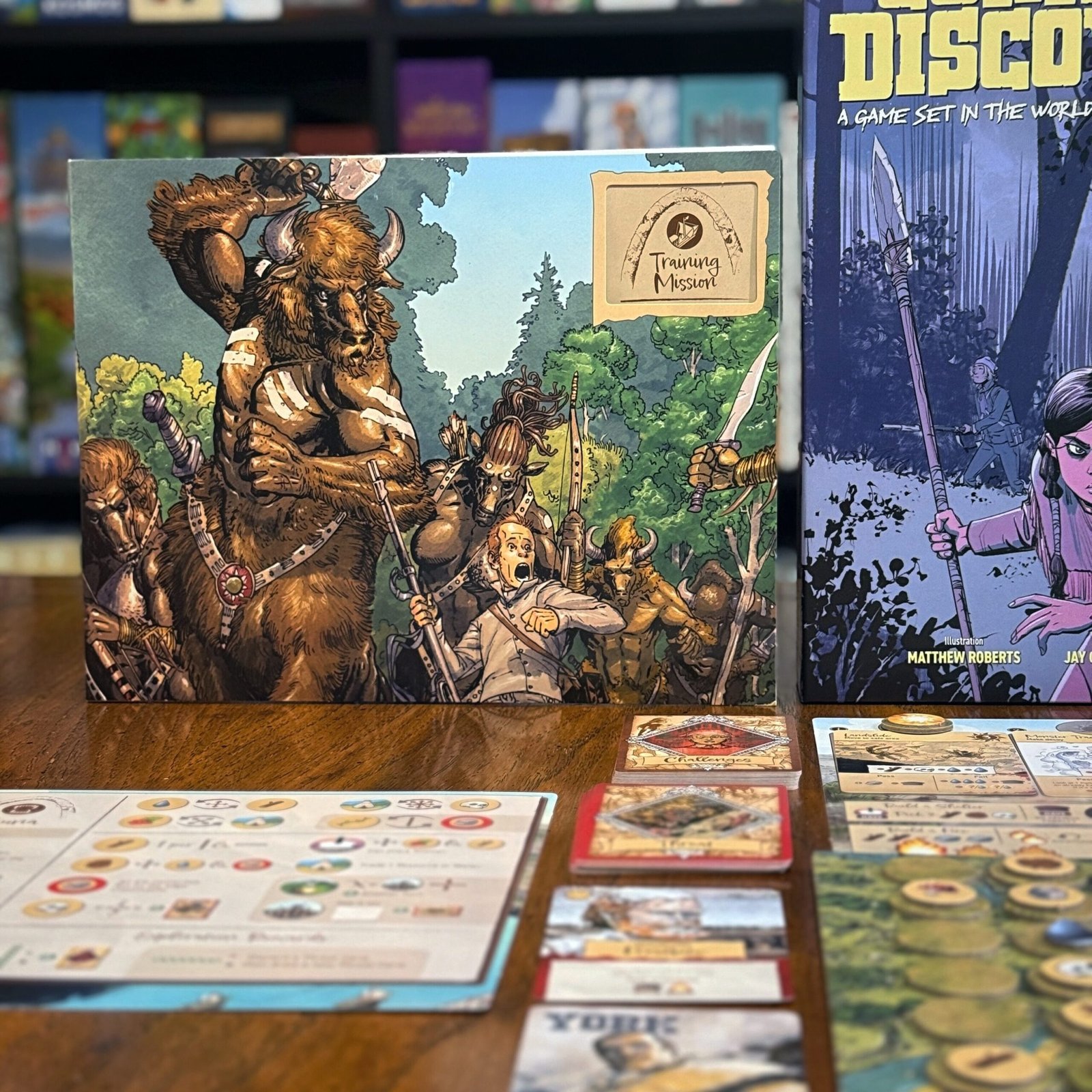
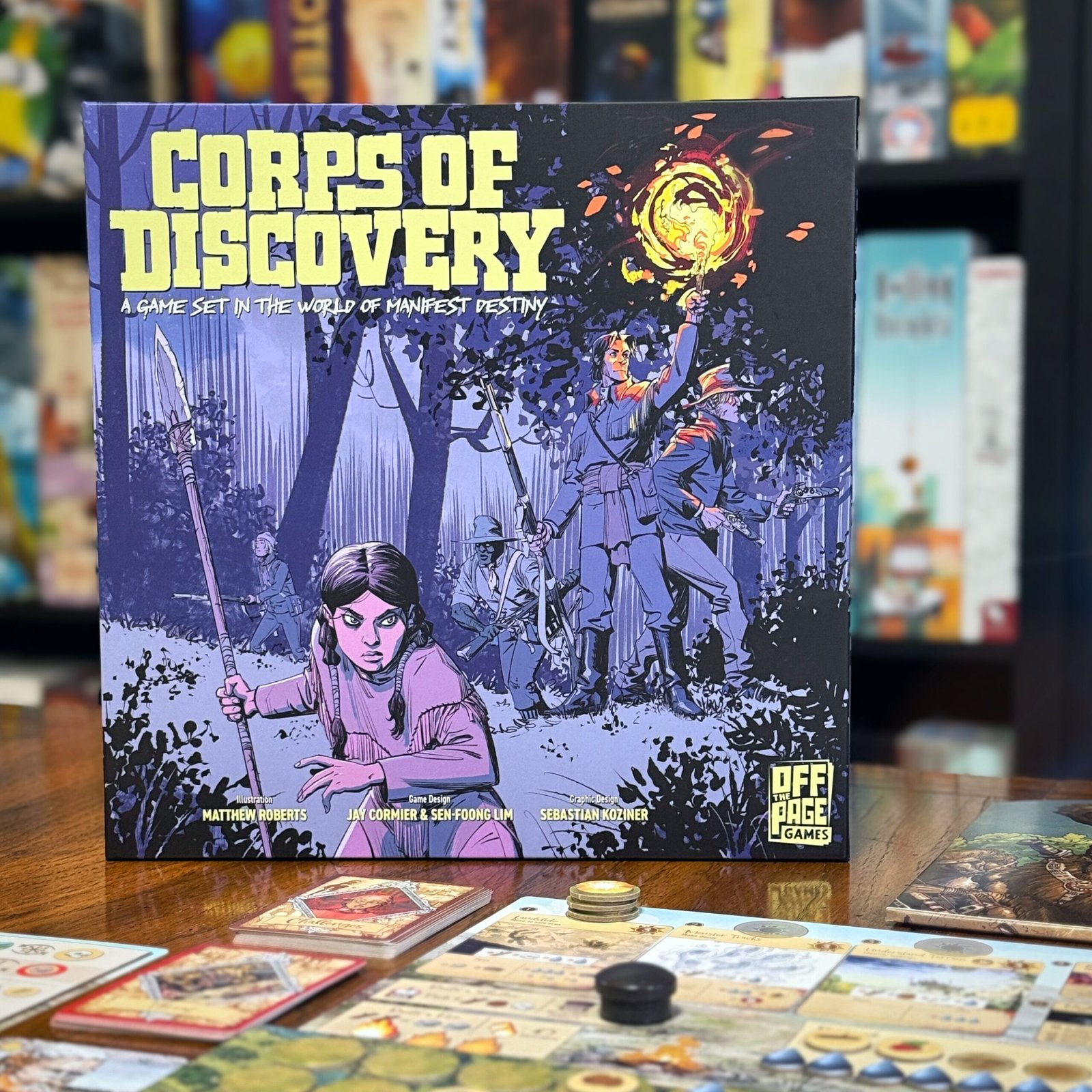
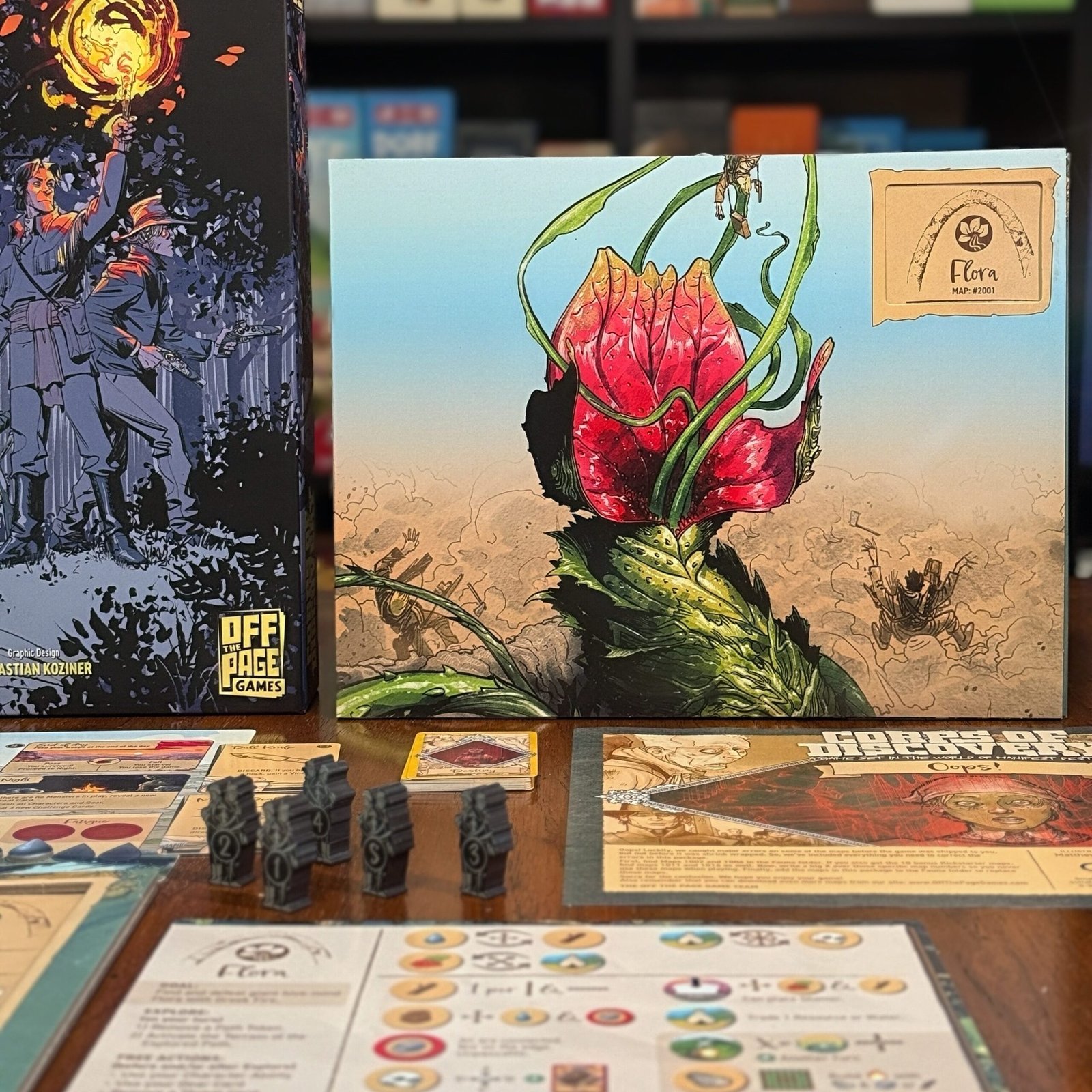
Corinna’s Rating: 8.9
Duncan’s Rating: 8.1
Check out Corps of Discovery on Board Game Geek for more information.
A copy of this game was generously provided by Off The Page Games for content creation.

One response to “The Core of Discovery, or Just Another Lost Expedition? | A Corps of Discovery Review”
thanks to the author for taking his clock time on this one.